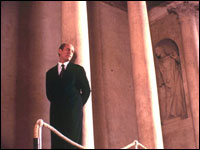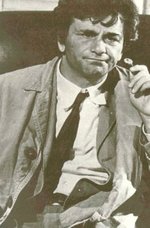July 28, 2006
Ripley vs Columbo
 |
Who would win: Ripley or Columbo?
The question is not an idle one, since there is a perfect structural symmetry between the two characters: Ripley, the leisure elite fake, who outwits all the cops who suspect him but who can prove nothing; and Columbo, the implacable hunter/ haunter of the wealthy and privileged, who uses the very arrogance of his prey to trap them.
An encounter between Ripley and Columbo would bring together two characters whose genealolgy can be traced back to Dostoyesvsky’s Crime and Punishment. Ripley was a kind of Raskolnikov in reverse, not using murder to prove his superiority but to attain a higher social status, while Columbo was famously based on Porfiry Petrovic, the detective who circled around Raskolnikov until the young student was undone by his own guilt.
It is hard to imagine Ripley breaking in the way that Raskolnikov does, since he does not have a guilty conscience that can be played upon. Similarly, it is hard to imagine Columbo – the implacable agent of Justice in shabby garb - giving up in the way that Ripley’s hapless police adversaries end up doing.
Columbo’s victories do not depend on knowledge – the preternatural thing about Columbo is that he knows immediately who the killer is – but upon proof. ‘Proof’ is the moment when knowledge of power’s obscene underside passes over into the Symbolic. Yet there is no-one who respects the power of the Symbolic more than Ripley, no-one who would be more careful to avoid condemning himself in the eyes of the big Other.
If Columbo could not manipulate Ripley’s conscience, he might be able to use his jouissance. Ripley does not enjoy killing but he does enjoy demonstrating his prowess for disguise and mimicry, and he enjoys the threat of his status and wealth being taking away. What other explanation is there for his willingness to centrally involve himself in schemes which are so risky? A clue to Ripley’s jouissance comes when when, towards the end of Ripley’s Game, defending Belle Ombre against mafia gunmen, Ripley (apparently inexplicably) laughs.
But perhaps Ripley would do what none of Columbo’s adversaries do and simply kill the detective.
Speaking of Ripley, here’s Daniel, with a brilliant reply to my previous Ripley post. ‘What better expression could there be of ceaseless externalized judgement of your very ability to be yourself, than our modern risk society, in which enjoyment itself has become a duty, and you can be anything you like, and indeed, will have have to be, so long as it pays.’ Indeed…
Daniel proposes that Talking Heads’ ‘Once in a Lifetime’ could also be the soundtrack to Ripley at Belle Ombre. (Another Roxy connection, of course, since Eno produced Remain in Light.) But, for me, ‘Once in a Lifetime’ would be better compared to Roxy’s ‘In Every Dream Home a Heartache’ because there is still a distance between the singer and the lifeStyle that is being sung about; ‘penthouse perfection’ still horrifies as much as it beguiles. Avalon is not about wealth and privilege; it is the very sound of wealth and privilege, the consummation of Ferry’s implicit ambition to remove all the trappings of Teen and Rebellion from Pop and transform it into background muzak for the leisured elite. This is more about a conspicuous demonstration of Taste than about the lyrics. Check the session musician sheen and the preposterous video for ‘Avalon’ the single: the windswept Ferry in a tuxedo with a falcon on his arm…
Daniel is right to argue that ‘The very special delirium of Ripley is that, effectively, he is being judged by the big Other on precisely how well he performs the part of Ripley.’ But, if the big Other does not exist, who is doing the judging? Ulimately, the answer has to be: Ripley himself. Part of the reason that Ripley kills Dickie Greenleaf in the first place, is that, if Tom plays the part of Dickie, he can function as his own ego-ideal. Dickie has failed to perform adequately as Tom’s ego-ideal; becoming Dickie both allows Tom to escape the turmoil and shame of (one aspect of) his own subjectivity and to ‘correct’ Dickie’s mediocrity and vulgarity by playing the role better than Dickie could himself. The Dickie performance prepares the way for the possibility of a Tom Ripley identity that Tom can perform without a sense of shaming inadequacy.
I don’t think it is quite true that Ripley can never achieve success. It is, rather, that success is not in itelf sufficient – Ripley is perfectly happy at Belle Ombre, but who be satisfied with happiness? That is why, in order to experience enjoyment, rather than pleasure, Ripley has to keep putting his Status at risk.
__________________________________________________________________
I think we can gain another insight the big Other from ‘Wyatting’. I remain deeply ambivalent about the phenomenon, but I’m more sympathetic to the motives of some of those involved after reading Carl Neville’s account of participating in it. Carl’s attack on ‘that horribly sentimentalized middle class viewpoint that its horrendous to sneer at "normal" people and disrupt their "normal" perfectly harmless Friday nights out etc,’ gets to the heart of what is wrong with Popism and its academic twin, Cult Studs. There’s an awful poignancy to Carl’s description of he and his fellow Wyatters’
- love/hate relationship with the class that we were always estranged from but for which none the less we continue to nurture a kind of angry hope..we are appallingly conflicted ourselves.. there is for us a particular heightened poignancy in, for example, putting on card-carrying-Commie Robert Wyatt's exquisite version of "Red Flag" in a pub full of pissed-up Proles and watching them pull faces and shout to have it turned off... a particularly bitter amusement, compounded of many emotions...
The question Carl poses at the end - ‘how do you Wyatt a bar full of Resonance FM listeners.... a bar full of super eclectic, super ironic Fashionistas (I'm guessing M-People's " Elegant Slumming", is pretty much the key.)’ – makes it clear that what constitutes Noise is structural position rather than any inherent features of the sound itself. Wyatting can be seen as one response to the impasse that Simon described in his piece on Noise in Blissed Out: without a big Other who can be annoyed and scandalized, Noise loses it cache.
The fact that the site for Wyatting is pubs is also revelatory, especially in a week in which Top of the Pops is finally limping to its inglorious end. Part of the thrill we got from performances by the likes of Japan and the Associates on Top of the Pops came from the fact that they we knew they were being broadcast into so-called ‘normal’ living rooms. The ‘normal’ context of the show itself - the hopelessly out-of-touch pre-Yoof Radio 1 presenters and the mediocrity of the surrounding bands - added to the intensity. But those bizarre incongruities were features of Old Media broadcasting, elminated by the proliferation of niche marketed narrowcast digital channels. The only site you will be able to reach anything like a general audience now is, indeed, pubs, so it is here that digitial hyper-choice can come into tension with ‘normality’. It is difficult, though, to see that tension generating anything but pointless rancour and/ or bemused incomprehension. British people will defend, sometimes literally to the death, their absolute right to reality-confirming convalescent oblivion. The game was up when breweries managed to successfully market pubs as anything other than places in which the defeated and the dejected - old men and (pre-Cool) Coronation Street characters - shuffled off into the sidings of life. The Rover's Return: Britain's popcultural answer to Waiting for Godot: a confirmation that 'no-one moves', that any attempt to escape ends up in the same drab familiarity. Pubs, like universities, are unredeemable; nothing can ever happen in them. That is what they are for: to suck everything into a black hole of vegetative inertia…
Posted by mark at July 28, 2006 03:19 PM | TrackBack